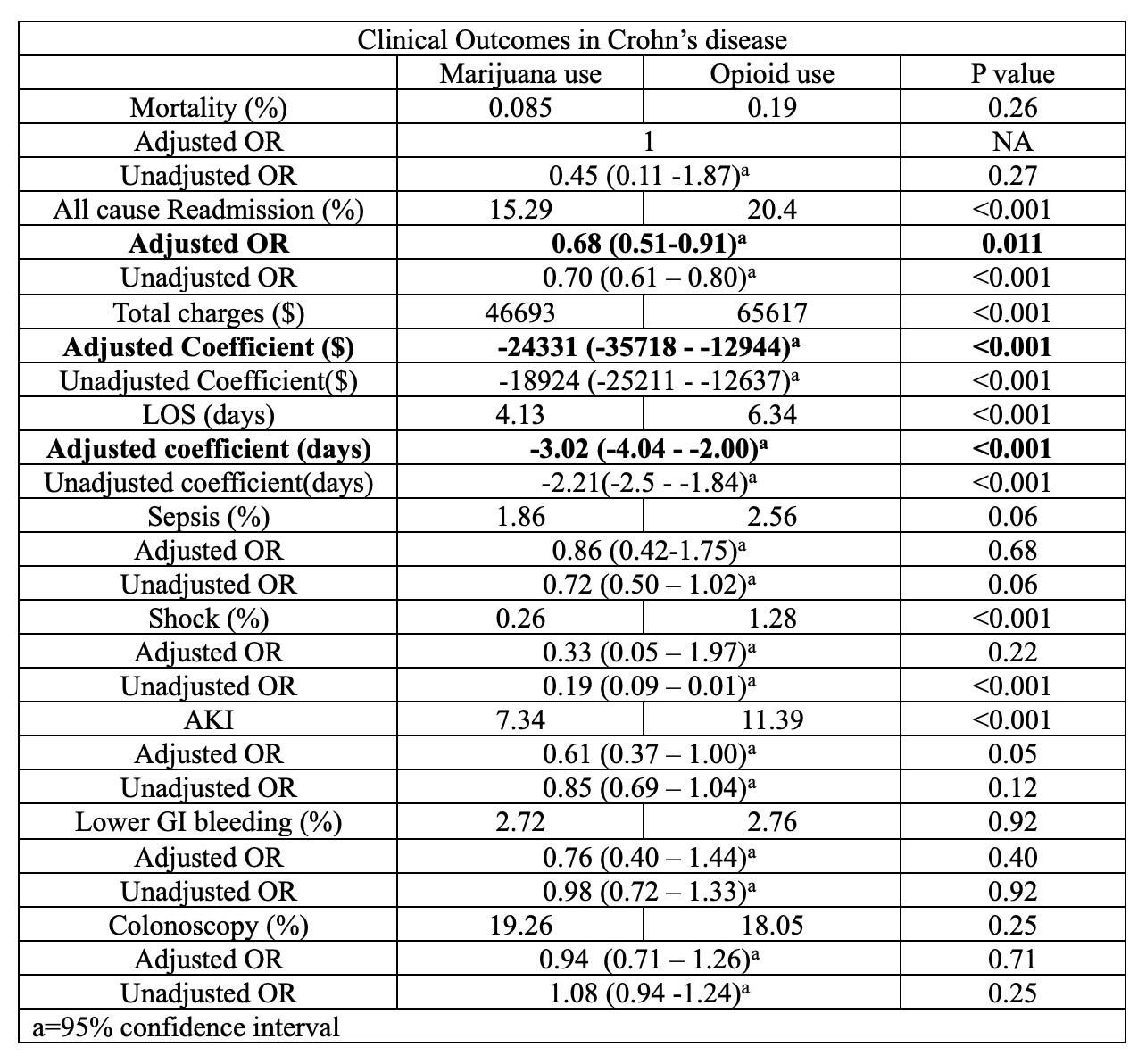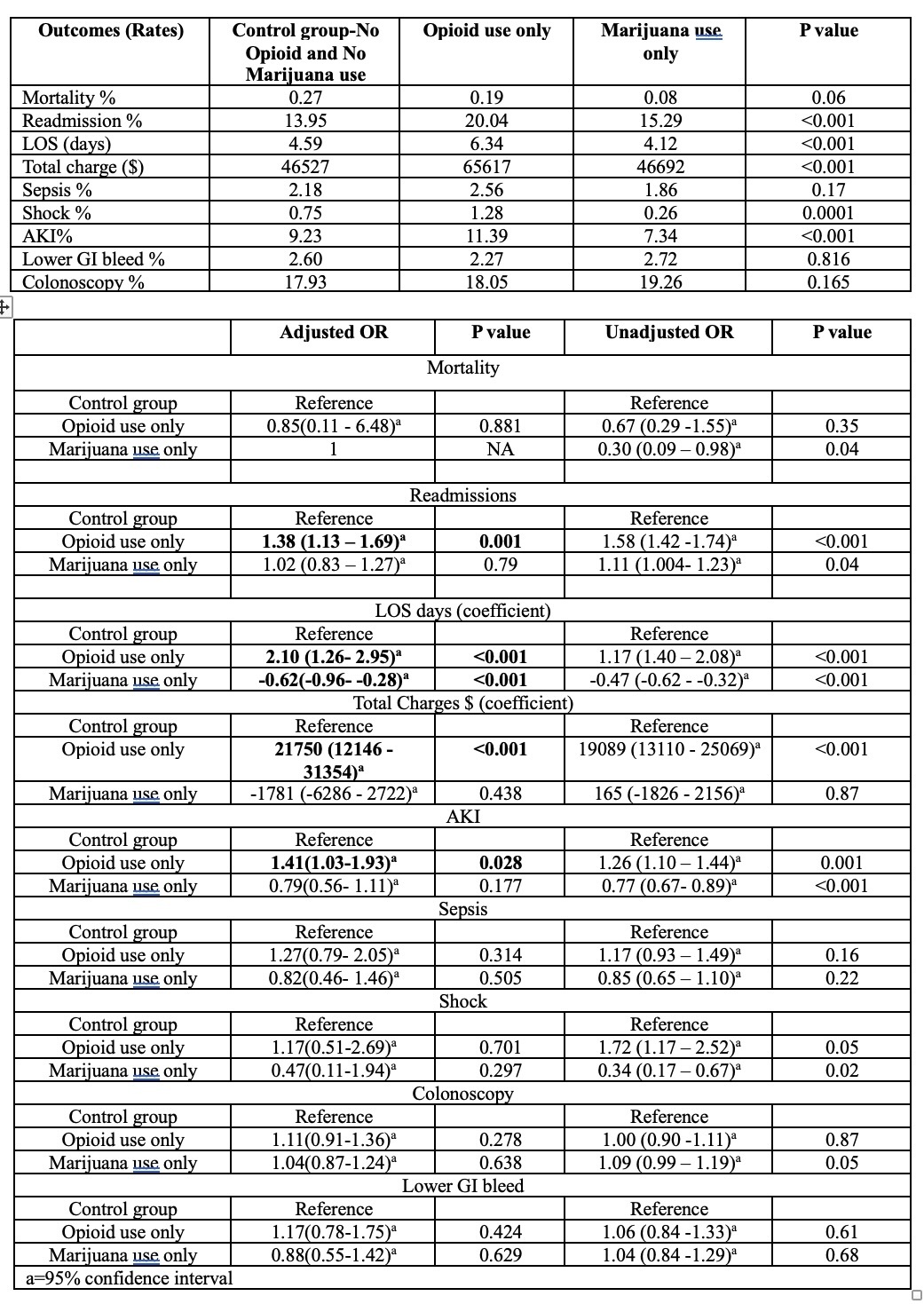Sunday Poster Session
Category: IBD
P1093 - Marijuana Use Is Associated With Reduced Health Care Burden Compared to Opioid Use in Inflammatory Bowel Disease: A Nationwide Study
Sunday, October 26, 2025
3:30 PM - 7:00 PM PDT
Location: Exhibit Hall
.jpeg.jpg)
Madhav Changela, MD
One Brooklyn Health-Interfaith Medical Center
Brooklyn, NY
Presenting Author(s)
Madhav Changela, MD1, Janak Bahirwani, MD2, Maulik Kaneriya, MD1, Nishit Patel, MD3, Sanket Basida, MD4, Krishna Bodrya, MD5, Yecheskel Schneider, MD, MS6
1One Brooklyn Health-Interfaith Medical Center, Brooklyn, NY; 2Kadlec Regional Medical Center, Richland, WA; 3St. Luke's University Health Network, Bethlehem, PA; 4University of Missouri School of Medicine, Columbia, MO; 5Leigh Valley Health Network, Easton, PA; 6Virtua Health System, Moorestown, NJ
Introduction: Crohn’s disease being a significant contributor to gastrointestinal hospitalization, often leads to recurrent admissions and substantial healthcare utilization. Opioid and marijuana have been used in the management of the Crohn’s disease, but they exhibit different safety and utilization profiles. We tried to evaluate the effects of these agents on clinical outcomes, healthcare utilization and readmissions in Crohn’s disease.
Methods: This retrospective analysis utilized data from the National Readmission Database 2018 to 2021. We included all patients aged 18 years and older admitted for Crohn’s disease. The study was conducted in two ways: first, comparing patients who used opioids or marijuana to those who used neither; and second, comparing marijuana users to opioid users. Primary outcomes were in-hospital mortality and 30-day all-cause readmission. Secondary outcomes were length of stay(LOS), total hospitalization charges, sepsis, shock, acute kidney injury(AKI), lower gastrointestinal bleeding, and performance of colonoscopy. Univariate and multivariate regression models were employed to assess outcomes. P-value of < 0.05 was considered statistically significant.
Results: Among 162,974 patients with Crohn’s disease, 3.15% used opioids and 3.94% used marijuana. Compared to patients not using either substance, opioid users were associated with significantly higher odds of hospital readmissions. In contrast, marijuana users had lower odds of readmission when compared to opioid users. Compared to patients not using either, opioid users had longer LOS while marijuana users had shorter. Compared to opioid users, marijuana use was associated with a significantly shorter LOS. Total charges were higher among opioid users compared to the control group and significantly lower among marijuana users when compared directly to opioid users. AKI was more common in opioid users compared to controls. No other significant differences in clinical outcomes were observed. Other significant predictors of all cause readmissions included John Hopkins ACG Frailty and colonoscopy. Details of the analysis are outlined in Table 1 and 2.
Discussion: This study findings highlight the potential adverse effects of opioid use and suggest a possible role for marijuana in reducing healthcare burden in Crohn’s disease. Further research is warranted to better understand the comparative benefits and risks of opioids and marijuana in management of Crohn’s disease.

Figure: Table 1: Comparison of outcomes in opioid and marijuana use groups versus the control group in Crohn's disease.

Figure: Comparison of outcomes in marijuana group with opioid group in Crohn's disease.
Disclosures:
Madhav Changela indicated no relevant financial relationships.
Janak Bahirwani indicated no relevant financial relationships.
Maulik Kaneriya indicated no relevant financial relationships.
Nishit Patel indicated no relevant financial relationships.
Sanket Basida indicated no relevant financial relationships.
Krishna Bodrya indicated no relevant financial relationships.
Yecheskel Schneider indicated no relevant financial relationships.
Madhav Changela, MD1, Janak Bahirwani, MD2, Maulik Kaneriya, MD1, Nishit Patel, MD3, Sanket Basida, MD4, Krishna Bodrya, MD5, Yecheskel Schneider, MD, MS6. P1093 - Marijuana Use Is Associated With Reduced Health Care Burden Compared to Opioid Use in Inflammatory Bowel Disease: A Nationwide Study, ACG 2025 Annual Scientific Meeting Abstracts. Phoenix, AZ: American College of Gastroenterology.
1One Brooklyn Health-Interfaith Medical Center, Brooklyn, NY; 2Kadlec Regional Medical Center, Richland, WA; 3St. Luke's University Health Network, Bethlehem, PA; 4University of Missouri School of Medicine, Columbia, MO; 5Leigh Valley Health Network, Easton, PA; 6Virtua Health System, Moorestown, NJ
Introduction: Crohn’s disease being a significant contributor to gastrointestinal hospitalization, often leads to recurrent admissions and substantial healthcare utilization. Opioid and marijuana have been used in the management of the Crohn’s disease, but they exhibit different safety and utilization profiles. We tried to evaluate the effects of these agents on clinical outcomes, healthcare utilization and readmissions in Crohn’s disease.
Methods: This retrospective analysis utilized data from the National Readmission Database 2018 to 2021. We included all patients aged 18 years and older admitted for Crohn’s disease. The study was conducted in two ways: first, comparing patients who used opioids or marijuana to those who used neither; and second, comparing marijuana users to opioid users. Primary outcomes were in-hospital mortality and 30-day all-cause readmission. Secondary outcomes were length of stay(LOS), total hospitalization charges, sepsis, shock, acute kidney injury(AKI), lower gastrointestinal bleeding, and performance of colonoscopy. Univariate and multivariate regression models were employed to assess outcomes. P-value of < 0.05 was considered statistically significant.
Results: Among 162,974 patients with Crohn’s disease, 3.15% used opioids and 3.94% used marijuana. Compared to patients not using either substance, opioid users were associated with significantly higher odds of hospital readmissions. In contrast, marijuana users had lower odds of readmission when compared to opioid users. Compared to patients not using either, opioid users had longer LOS while marijuana users had shorter. Compared to opioid users, marijuana use was associated with a significantly shorter LOS. Total charges were higher among opioid users compared to the control group and significantly lower among marijuana users when compared directly to opioid users. AKI was more common in opioid users compared to controls. No other significant differences in clinical outcomes were observed. Other significant predictors of all cause readmissions included John Hopkins ACG Frailty and colonoscopy. Details of the analysis are outlined in Table 1 and 2.
Discussion: This study findings highlight the potential adverse effects of opioid use and suggest a possible role for marijuana in reducing healthcare burden in Crohn’s disease. Further research is warranted to better understand the comparative benefits and risks of opioids and marijuana in management of Crohn’s disease.

Figure: Table 1: Comparison of outcomes in opioid and marijuana use groups versus the control group in Crohn's disease.

Figure: Comparison of outcomes in marijuana group with opioid group in Crohn's disease.
Disclosures:
Madhav Changela indicated no relevant financial relationships.
Janak Bahirwani indicated no relevant financial relationships.
Maulik Kaneriya indicated no relevant financial relationships.
Nishit Patel indicated no relevant financial relationships.
Sanket Basida indicated no relevant financial relationships.
Krishna Bodrya indicated no relevant financial relationships.
Yecheskel Schneider indicated no relevant financial relationships.
Madhav Changela, MD1, Janak Bahirwani, MD2, Maulik Kaneriya, MD1, Nishit Patel, MD3, Sanket Basida, MD4, Krishna Bodrya, MD5, Yecheskel Schneider, MD, MS6. P1093 - Marijuana Use Is Associated With Reduced Health Care Burden Compared to Opioid Use in Inflammatory Bowel Disease: A Nationwide Study, ACG 2025 Annual Scientific Meeting Abstracts. Phoenix, AZ: American College of Gastroenterology.
